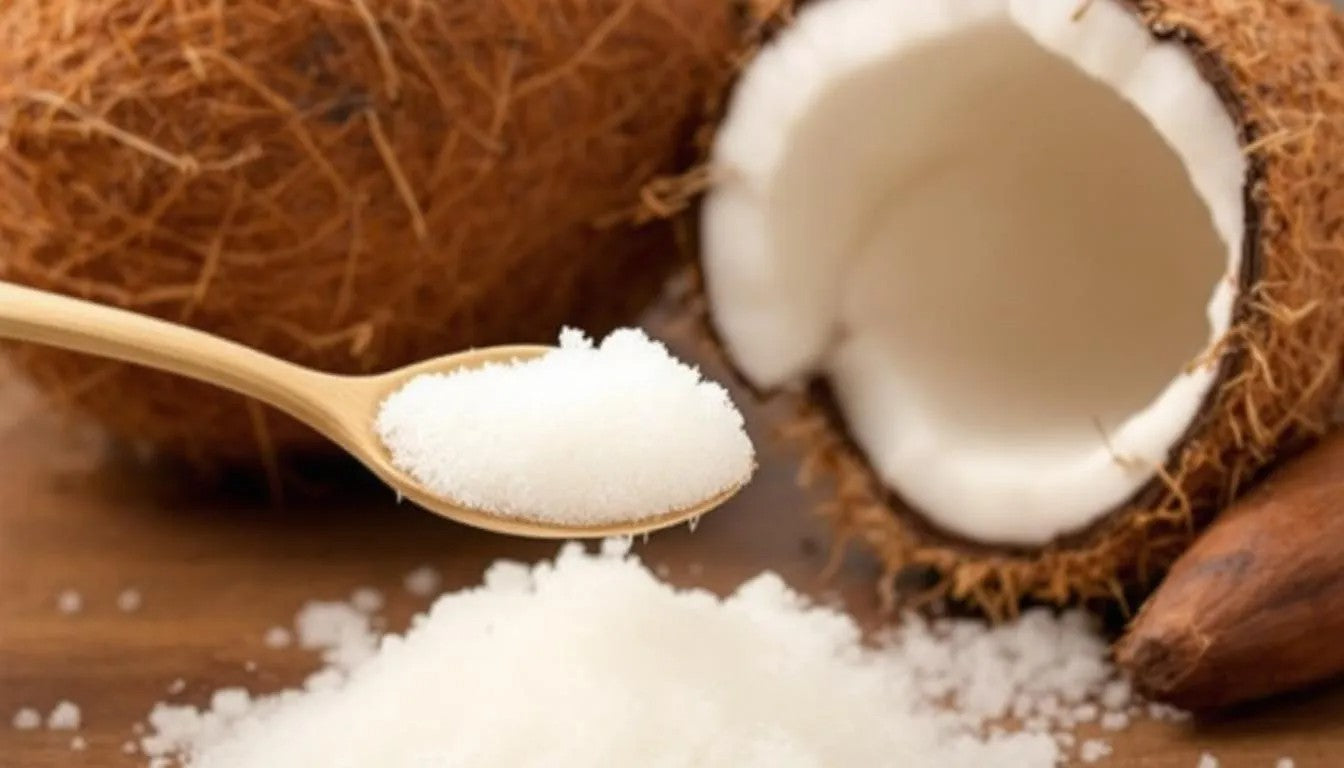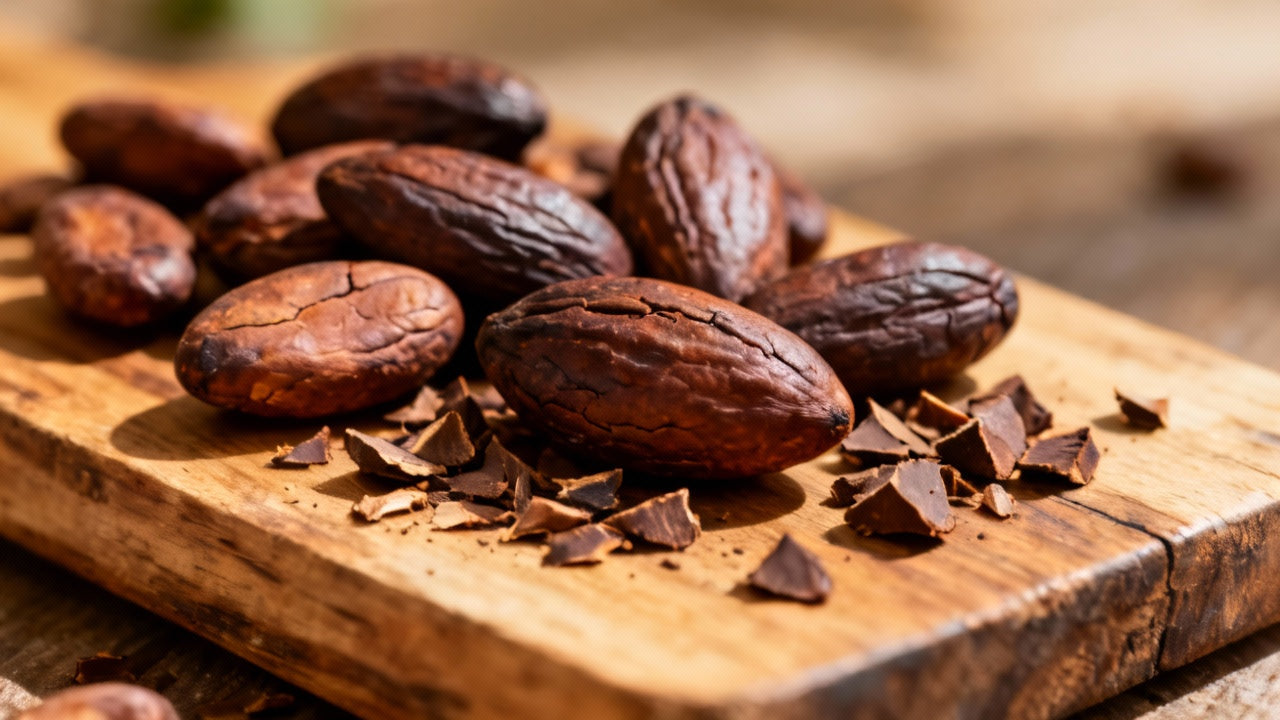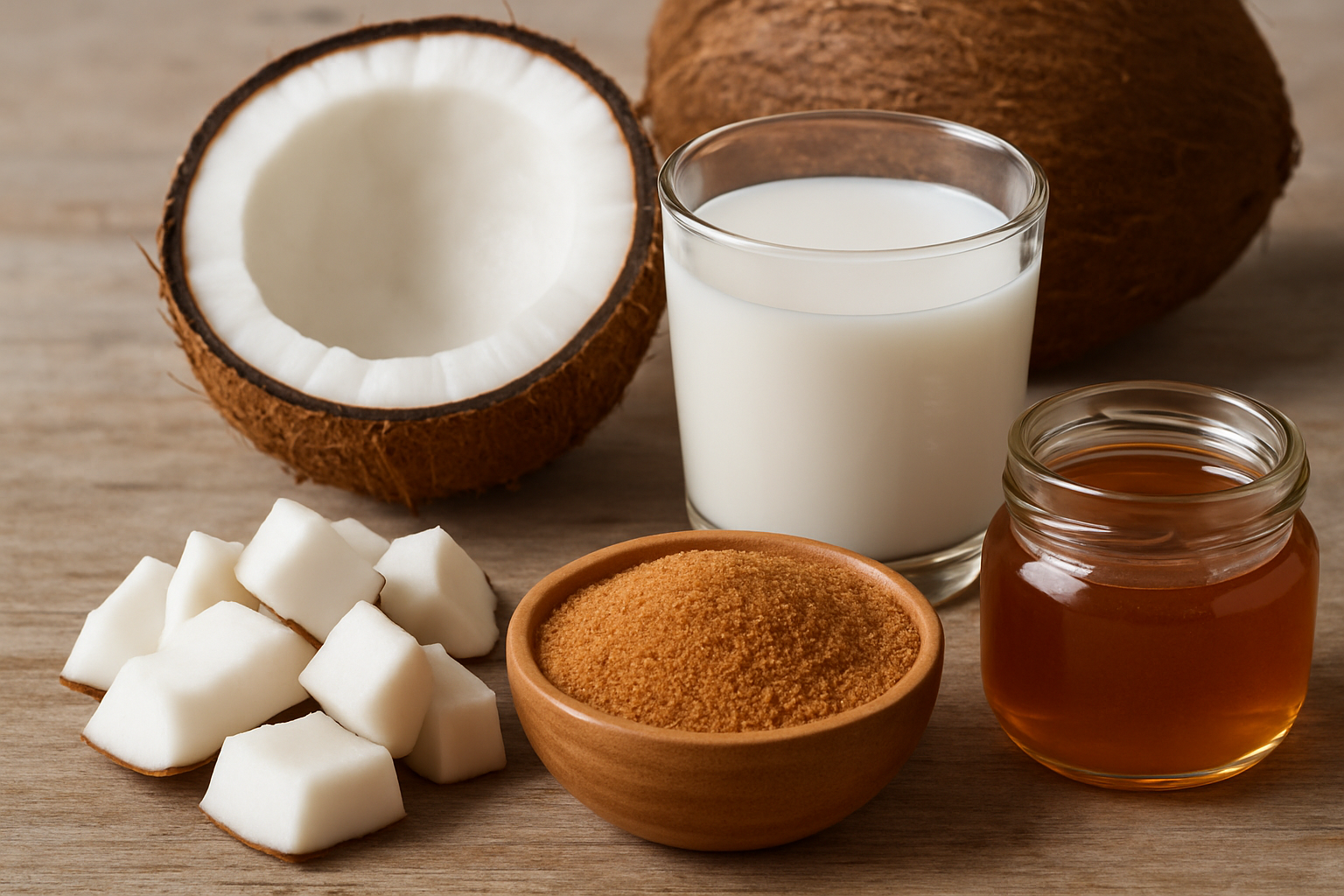
Coconut Palm Sugar: The Natural Sweetener Revolutionizing Healthy Chocolate
In the world of natural sweeteners, coconut palm sugar has emerged as a star ingredient for health-conscious consumers and artisanal food producers alike. At Coracao Confections, our commitment to creating exceptional chocolate with integrity extends to every ingredient we use, including the sweeteners that enhance our creations. Coconut palm sugar plays a crucial role in our recipes, allowing us to craft delicious treats that align with our values of sustainability, nutrition, and pure flavor.
This comprehensive guide explores everything you need to know about coconut palm sugar: what it is, how it differs from other sweeteners, its impressive nutritional profile, and why it's the perfect companion to premium chocolate. Whether you're curious about the sweetener we use in our products or looking to incorporate this natural alternative into your own kitchen, this article will provide valuable insights into one of nature's most remarkable sweeteners.
Understanding Coconut Palm Sugar: Nature's Golden Sweetener
Coconut palm sugar (often simply called coconut sugar) is a natural sweetener derived from the sap of coconut palm tree blossoms. Despite its name containing "coconut," this sweetener doesn't actually taste like coconut—instead, it offers a rich, caramel-like flavor with subtle notes of butterscotch that adds depth and complexity to any recipe.
The process of creating coconut sugar begins with harvesting the nectar from the flower buds of the coconut palm (Cocos nucifera). This is distinct from palm sugar made from other palm species, such as the date palm or sugar palm, though they're sometimes confused in the marketplace.
What makes coconut sugar special is both its production method and its nutritional profile, which preserves more of the natural nutrients found in the coconut palm sap compared to highly refined sweeteners like white sugar.

Coconut Sugar vs. Palm Sugar: Important Distinctions
There's often confusion between coconut sugar and other palm sugars, which is understandable given their similar names and appearances. Here's how to distinguish between them:
Coconut Palm Sugar
- Derived specifically from the Cocos nucifera (coconut palm)
- Light to dark brown in color
- Caramel-like flavor with subtle notes
- Typically produced using sustainable methods that preserve the tree
- Contains natural nutrients including minerals and inulin
Other Palm Sugars
- May come from various species including Borassus flabellifer (Palmyra palm) or Arenga pinnata (sugar palm)
- Similar appearance to coconut sugar
- Flavor profiles vary by source
- Production methods and sustainability practices vary
- Nutritional profiles differ depending on source and processing
At Coracao Confections, we specifically use coconut palm sugar in products like our Berkeley Bar Vegan Chocolates and Salted Caramel Chocolate Bars for its superior flavor profile and nutritional benefits.
The Traditional Harvesting Process: From Blossom to Sweetener
The creation of coconut palm sugar involves a fascinating traditional process that has been practiced for generations in tropical regions:
1. Tapping the Flowers
Skilled farmers climb the coconut palms and make a small cut on the flower spadix (a flower-bearing stalk). The sap begins to flow and is collected in bamboo containers.
2. Collecting the Nectar
The containers are collected daily, yielding a fresh, clear liquid that's naturally sweet—this is known as coconut palm nectar.
3. Minimal Processing
The nectar is then gently heated in large woks or pans, causing the water to evaporate and the sugars to concentrate. Unlike refined sugar production, no chemicals or clarifying agents are used.
4. Crystallization
As the liquid reduces, it thickens and eventually crystallizes into a solid form that can range from soft and paste-like to granular, depending on the degree of processing.
5. Cooling and Packaging
The final product is cooled and may be ground into various textures, from fine crystals similar to traditional brown sugar to coarser granules.
This minimal processing approach preserves many of the natural nutrients found in the original sap, making coconut sugar nutritionally superior to conventional refined sugars.

Nutritional Benefits: Why Coconut Sugar Stands Apart
While coconut sugar is still a sweetener that should be consumed in moderation, it offers several nutritional advantages over refined white sugar and other alternatives:
Lower Glycemic Index
Coconut sugar has a glycemic index (GI) of approximately 35, compared to around 65 for table sugar. This lower GI means it causes a less dramatic spike in blood sugar levels, making it a better option for those monitoring their glucose response.
Mineral Content
Unlike refined sugar, which contains virtually no nutrients, coconut sugar retains several minerals from the original palm sap, including:
- Iron
- Zinc
- Calcium
- Potassium
- Magnesium
While present in small amounts, these minerals contribute to coconut sugar's nutritional advantage over refined alternatives.
Inulin Fiber
Coconut sugar naturally contains inulin, a type of soluble fiber that acts as a prebiotic, supporting beneficial gut bacteria. This fiber content also contributes to its lower glycemic impact.
Less Processing
The minimal processing of coconut sugar means it retains more of its natural compounds. By contrast, refined white sugar undergoes extensive processing that strips away all nutritional elements except pure sucrose.
These nutritional advantages align perfectly with our philosophy at Coracao Confections, where we believe that even sweet treats can be crafted with nutrition in mind. Our Vegan Dark Chocolate 81% combines high-quality cacao with coconut sugar for a treat that satisfies both in flavor and nutritional profile.
For more on how natural sweeteners complement the health benefits of quality chocolate, check out our blog post on Benefits of Dark Chocolate.
Sustainability: A Sweeter Choice for the Planet
Beyond its nutritional benefits, coconut palm sugar also offers impressive sustainability credentials:
Efficient Land Use
Coconut palms can produce up to 75% more sugar per acre than sugar cane while using less than 20% of the soil nutrients and water.
Tree Preservation
Unlike harvesting methods for some other sweeteners, collecting coconut palm sap doesn't harm the tree. A well-maintained coconut palm can produce sap for decades.
Intercropping Potential
Coconut palms thrive in diverse agroforestry systems, allowing farmers to grow other crops alongside them, supporting biodiversity and providing multiple income streams.
Lower Carbon Footprint
The traditional, low-tech production methods used for coconut sugar typically require less energy than industrial sugar refining, resulting in a lower carbon footprint.
Support for Small Farmers
Most coconut sugar comes from small-scale farmers in countries like Indonesia, the Philippines, and Thailand, providing valuable income opportunities for rural communities.
At Coracao Confections, our commitment to environmental stewardship makes coconut sugar a natural choice for our products. We're proud to be a Certified Climate Neutral company, and our ingredient choices reflect our dedication to sustainable practices.
Coconut Sugar and Chocolate: A Perfect Pairing
The relationship between coconut sugar and fine chocolate is nothing short of magical. Here's why this natural sweetener works so beautifully in chocolate creations:
Complementary Flavor Profiles
Coconut sugar's caramel notes enhance and complement cacao's natural flavor profile, creating depth and complexity that refined sugar simply cannot match. The result is a more sophisticated, nuanced chocolate experience.
Balanced Sweetness
Coconut sugar provides a balanced sweetness that doesn't overpower the delicate flavor notes in premium cacao. This allows the chocolate's unique characteristics to shine through rather than being masked by excessive sweetness.
Enhanced Mouthfeel
The natural composition of coconut sugar contributes to a pleasant mouthfeel in chocolate, creating a smooth, satisfying texture that melts beautifully on the palate.
Clean Label Advantage
For health-conscious consumers, chocolate sweetened with coconut sugar offers a clean label alternative to products containing refined sugars, corn syrup, or artificial sweeteners.
Our Hazelnut Chocolate Bars and Almond Butter Vegan Chocolate Bars showcase this perfect pairing of premium cacao and coconut sugar, delivering exceptional flavor while maintaining our commitment to quality ingredients.
Culinary Uses: Beyond Chocolate
While we specialize in chocolate at Coracao Confections, coconut sugar's versatility makes it an excellent choice for numerous culinary applications:
Baking
Coconut sugar can replace brown or white sugar in most baking recipes at a 1:1 ratio. It works particularly well in:
- Cookies and brownies
- Quick breads and muffins
- Cakes and cupcakes
- Granola and energy bars
Beverages
The rich flavor profile enhances various drinks:
- Coffee and tea
- Homemade hot chocolate (try our Rich Dark Drinking Chocolate for an exceptional experience)
- Smoothies and shakes
- Cocktails and mocktails
Savory Dishes
Don't limit coconut sugar to sweets—it adds depth to savory dishes as well:
- Marinades and glazes
- Barbecue sauces
- Asian-inspired dishes
- Salad dressings that balance sweet and savory notes
Raw Food Preparations
Because it's minimally processed, coconut sugar works beautifully in raw food recipes:
- Energy balls and bites
- Raw desserts and treats
- Chia puddings and overnight oats
- Raw chocolate creations
For those interested in creating their own chocolate treats at home, our Organic Cacao Butter and Organic Cacao Powder paired with coconut sugar make an excellent starting point.

How to Select and Store Quality Coconut Sugar
To ensure you're getting the best coconut sugar for your kitchen or enjoying products made with premium coconut sugar, keep these tips in mind:
Selecting Quality Coconut Sugar
- Color: Look for a warm brown color—extreme variations could indicate adulteration or quality issues
- Texture: Quality coconut sugar should be relatively dry and free-flowing, not extremely moist or clumpy
- Fragrance: It should have a pleasant, caramel-like aroma without any off or fermented smells
- Certifications: Organic certification ensures the sugar is produced without synthetic pesticides or fertilizers
- Sourcing: When possible, choose brands that provide information about their sourcing practices and farmer relationships
Proper Storage
- Airtight container: Store coconut sugar in a sealed container to prevent moisture absorption
- Cool, dry place: A pantry or cupboard away from heat sources is ideal
- Avoid refrigeration: The humidity in refrigerators can cause clumping
- Shelf life: Properly stored coconut sugar can last 1-2 years
At Coracao Confections, we source only premium organic coconut sugar for our chocolate creations, ensuring consistent quality and flavor in every product.
Frequently Asked Questions About Coconut Sugar
Is coconut sugar really healthier than regular sugar?
While coconut sugar is still a sweetener that should be consumed in moderation, it offers nutritional advantages over refined sugar, including minerals, inulin fiber, and a lower glycemic index. However, it should still be used mindfully as part of a balanced diet.
Does coconut sugar taste like coconut?
No, despite its name, coconut sugar doesn't taste like coconut. It has a rich, caramel-like flavor with notes of butterscotch that many people find more complex and interesting than regular sugar.
Can people with diabetes use coconut sugar?
While coconut sugar has a lower glycemic index than regular sugar, it still contains fructose and will raise blood sugar levels. People with diabetes should consult their healthcare provider about including any sweeteners in their diet, including coconut sugar.
How does coconut sugar affect baking properties?
Coconut sugar can make baked goods slightly darker and can impart a subtle caramel flavor. It's slightly less sweet than white sugar, so some recipes might need minor adjustments. It also doesn't cream with butter quite the same way as white sugar, which can affect texture in some recipes.
Is coconut sugar sustainable?
When properly harvested, coconut sugar is one of the more sustainable sweetener options. The UN Food and Agriculture Organization (FAO) has recognized it as the most sustainable sweetener in the world, though this depends greatly on specific production practices.
The Sweet Future of Conscious Indulgence
As consumers become increasingly aware of the impact their food choices have on both personal health and planetary wellbeing, ingredients like coconut palm sugar will continue to play an important role in the evolution of conscious indulgence. At Coracao Confections, we're proud to be at the forefront of this movement, crafting chocolate products that demonstrate how exceptional quality, flavor, and ethics can coexist.
Our use of coconut sugar is just one example of our commitment to creating chocolate that nourishes both body and soul. By choosing ingredients that honor traditional practices, support sustainable agriculture, and deliver superior nutritional profiles, we're redefining what chocolate can be.
Whether you're enjoying our Superberry Vegan Chocolate Bars sweetened with coconut sugar or exploring our Sugar Free Coconut Milk Chocolate options, you're participating in a movement toward more mindful consumption—one delicious bite at a time.
For more insights on how we're revolutionizing chocolate through quality ingredients and thoughtful production, check out our blog post on Types of Chocolate Bars.
Ready to experience the difference that premium ingredients like coconut sugar make in artisanal chocolate? Explore our collection of organic, vegan chocolate treats crafted with integrity and exceptional flavor.
Shop our collection and discover why conscious chocolate lovers choose Coracao Confections for both indulgence and wellbeing.

Claire Bennett
I'm Claire, a chocolate lover and artisan based in a small town where I run a tiny home kitchen dedicated to exploring everything chocolate. From single-origin dark bars to creamy ganache and handmade truffles, I find joy in working with all types of chocolate. I believe chocolate has a story, and I love bringing that story to life through humble, heartfelt creations.



Leave a comment
This site is protected by hCaptcha and the hCaptcha Privacy Policy and Terms of Service apply.